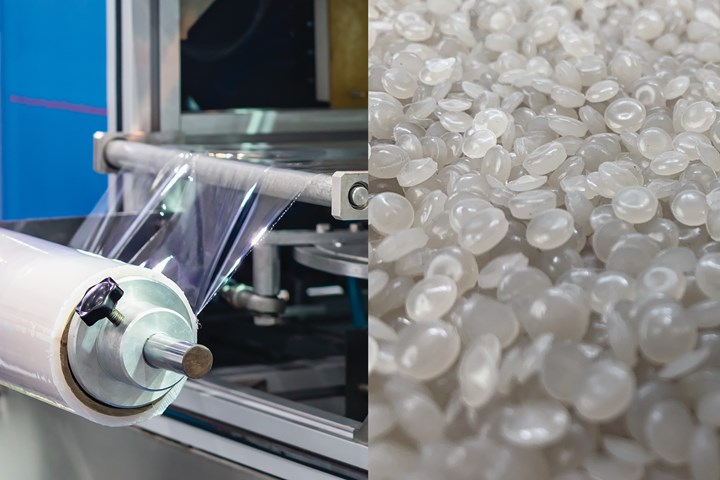Food Grade PCR LLDPE Resin From Mechanically Recycled Stretch Film
Revolution announced that the FDA has issued a letter of no objection for its method of producing linear low density polyethylene from recycled stretch film.
announced it has received an FDA letter of no objection (LNO) for its method of recycling linear low-density polyethylene (LLDPE) film for food contact applications. The FDA issues an LNO after reviewing a recycling process to determine if it is expected to produce suitable purity for food contact applications, and identifies the appropriate conditions of use. Clear post-consumer recycled (PCR) produced from Revolution’s process can be used at content levels up to 100% for products with conditions of use that include heat/boiling, frozen, refrigerated and room temperature.

Revolution’s LLDPE resin is recycled from stretch film and is suitable for food contact applications. Photo Credit: Revolution
Revolution's proprietary Sustainable Loop mechanical recycling method previously received a letter of no objection in 2021 for white LLDPE PCR processed from agricultural polytube.
“We are extremely proud of the rigorous standards and processes put in place by our team to produce the highest quality, food grade LLDPE PCR available on the market," says Revolution CEO Sean Whiteley. "By expanding our offering to now include clear PCR, we aim to continue setting an example of what is possible for the future of stretch film and other plastics, and to fuel the quick adoption and normalization of mechanically recycled materials as an effective, sustainable solution for the food packaging industry and beyond.”
, , and (formerly Sealed Air) currently offer Revolution's line of PCR resins in their flexible film products.
Related Content
-
NPE2024 Wrap-Up: Sustainability Dominates Show Floor News
Across all process types, sustainability was a big theme at NPE2024. But there was plenty to see in automation and artificial intelligence as well.
-
Film Extrusion: Boost Mechanical Properties and Rate of Composting by Blending Amorphous PHA into PLA
A unique amorphous PHA has been shown to enhance the mechanical performance and accelerate the biodegradation of other compostable polymers PLA in blown film.
-
Plastics Technology Year in Review: Your Favorite Reads of 2024
A year-end review of the top stories showcasing industry trends, advancements and expert insights. Revisit the articles that captured the attention of the plastics community.


